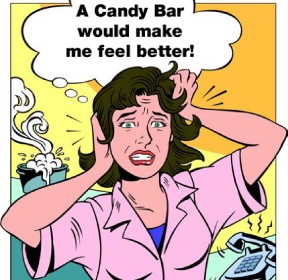 By Joan Kent, Ph.D.
By Joan Kent, Ph.D.
A looong time ago (1998), I wrote a doctoral dissertation that started with several observations about women with binge-eating disorder. One was their relationship with sugar. As I examined the DSM-IV criteria for substance dependence against the DSM-IV criteria for binge-eating disorder, it became obvious that addiction to sugar was very likely driving the binge eating. 'No kidding,' you say, but this was radical thinking in 1998.
My research divided the participants, all screened for binge-eating disorder, into three groups. The low-sugar group was given low-sugar nutrition guidelines to follow. They logged their food intake, including any binge episodes and/or cravings, and came to weekly support meetings.
The low-fat group followed low-fat guidelines, logged their food, binges and cravings, and attended weekly meetings. The control group had no nutrition guidelines or support meetings and simply logged their food, binges and cravings.
All groups reported periodically for weigh-ins and measurements.
Bingeing and craving decreased most in the low-sugar group. Weight loss was greatest in that group, although the weight loss couldn”™t be fully explained by comparing calorie intake among the groups.
What I find funny (okay, maybe a little irritating) is that people are now — in 2014 — finally — at long last — finding a connection between sugar addiction and the obesity epidemic. I guess the 1985-1999 low-fat craze — and a “craze” is what it was — had to die before people could see what was going on. (What can I say? My mother always told me I saw connections others didn”™t.)
So how does sugar contribute to the obesity epidemic? Let”™s take a look at what sugar does:
- Sugar triggers a “priming” reaction — even a little makes us want more. This is due to a specific dopamine receptor in the brain. Some people experience this more acutely than others. I consider this effect of sugar the main argument against eating “a small amount” of what we crave. Priming can turn that into a very large amount.
- It”™s addictive, so it definitely makes us want lots of sugary food and encourages over-consumption.
- Sugar addiction is physiologically real. It may cause withdrawal symptoms (cravings, agitation, restlessness, inability to focus, and more) when it”™s not available. Seeking and eating sugar frequently to end the discomfort of withdrawal can lead to overeating and weight gain.
- Sugar may be responsible for what I named “secondary fat consumption”. None of the study participants got cravings for fats. Almost all got cravings for sugar. But! In response to the sugar cravings, they”™d often eat foods that contained lots of fat. For example, a craving for sweet was likely to be answered with a bowl of ice cream — high in both sugar and fat. Why? Research shows that fat makes sugar taste sweeter. The added calories and fat were significant in all groups.
- It triggers the release of beta-endorphin in the brain. Beta-endorphin inhibits the brain”™s primary satiety center (the VMH). That may increase appetite, increase food consumption at a given meal — and lead to more frequent meals.
- Beta-endorphin changes food preferences toward other beta-endorphin triggers: fats or more sugar. The preference for healthful fare, such as vegetables, shrinks in comparison to those foods. Calorie intake can easily rise. Also, meals that are high in fat can trigger ghrelin, a hormone that tends to increase appetite as it slows metabolism — a potentially dangerous combination for weight and health.
It”™s clear from this list that sugar makes it all too easy to over-consume food and calories, especially empty calories. We can see the role it plays in binge eating and overweight. I stress that this connection was crystal clear to me in 1998 when I wrote my dissertation, and still in 1999 when it was completed.
So thanks for indulging me. I just needed to take credit for this, since credit is now being claimed by others some 15-plus years later.
- New Year’s Resolutions: A Sugar Addict’s Survival Guide - April 15, 2024
- Motivation vs. Enthusiasm - October 12, 2023
- Why Exercise Shouldn’t Be Just One Thing - November 9, 2022

So Joan, are you still a proponent of the Super B Complex shot a day to keep the sugar away?
Chuck,
I replied to this a few days ago but don’t see the reply here. (???) My answer was yes, although liquid B-complex could be considered more of an “emergency” measure. If cravings are an ongoing problem for someone, I’d suggest that he/she modify diet first. Check some of my past posts for guidelines on that.
Thanks for your question,
Joan